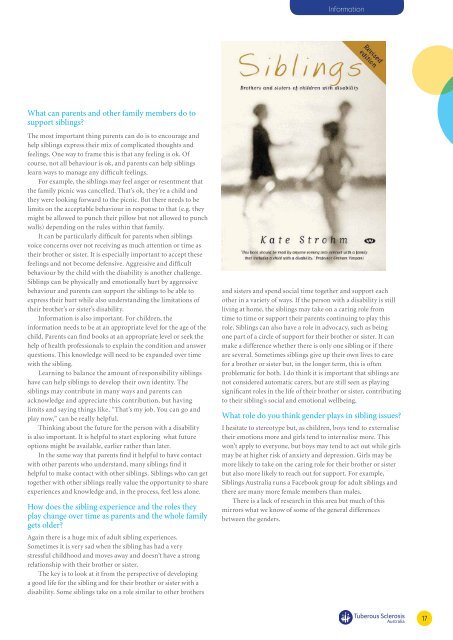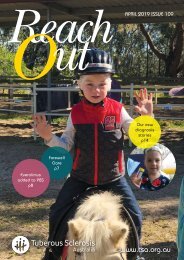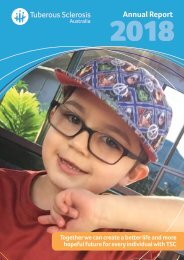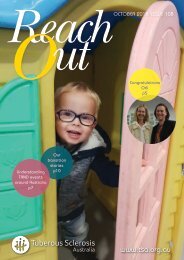Reach Out April 2018
Information about tuberous sclerosis and news from Tuberous Sclerosis Australia. This issue includes a special focus on siblings.
Information about tuberous sclerosis and news from Tuberous Sclerosis Australia. This issue includes a special focus on siblings.
Create successful ePaper yourself
Turn your PDF publications into a flip-book with our unique Google optimized e-Paper software.
Personal Information Stories<br />
What can parents and other family members do to<br />
support siblings?<br />
The most important thing parents can do is to encourage and<br />
help siblings express their mix of complicated thoughts and<br />
feelings. One way to frame this is that any feeling is ok. Of<br />
course, not all behaviour is ok, and parents can help siblings<br />
learn ways to manage any difficult feelings.<br />
For example, the siblings may feel anger or resentment that<br />
the family picnic was cancelled. That’s ok, they’re a child and<br />
they were looking forward to the picnic. But there needs to be<br />
limits on the acceptable behaviour in response to that (e.g. they<br />
might be allowed to punch their pillow but not allowed to punch<br />
walls) depending on the rules within that family.<br />
It can be particularly difficult for parents when siblings<br />
voice concerns over not receiving as much attention or time as<br />
their brother or sister. It is especially important to accept these<br />
feelings and not become defensive. Aggressive and difficult<br />
behaviour by the child with the disability is another challenge.<br />
Siblings can be physically and emotionally hurt by aggressive<br />
behaviour and parents can support the siblings to be able to<br />
express their hurt while also understanding the limitations of<br />
their brother’s or sister’s disability.<br />
Information is also important. For children, the<br />
information needs to be at an appropriate level for the age of the<br />
child. Parents can find books at an appropriate level or seek the<br />
help of health professionals to explain the condition and answer<br />
questions. This knowledge will need to be expanded over time<br />
with the sibling.<br />
Learning to balance the amount of responsibility siblings<br />
have can help siblings to develop their own identity. The<br />
siblings may contribute in many ways and parents can<br />
acknowledge and appreciate this contribution, but having<br />
limits and saying things like, “That’s my job. You can go and<br />
play now,” can be really helpful.<br />
Thinking about the future for the person with a disability<br />
is also important. It is helpful to start exploring what future<br />
options might be available, earlier rather than later.<br />
In the same way that parents find it helpful to have contact<br />
with other parents who understand, many siblings find it<br />
helpful to make contact with other siblings. Siblings who can get<br />
together with other siblings really value the opportunity to share<br />
experiences and knowledge and, in the process, feel less alone.<br />
How does the sibling experience and the roles they<br />
play change over time as parents and the whole family<br />
gets older?<br />
Again there is a huge mix of adult sibling experiences.<br />
Sometimes it is very sad when the sibling has had a very<br />
stressful childhood and moves away and doesn’t have a strong<br />
relationship with their brother or sister.<br />
The key is to look at it from the perspective of developing<br />
a good life for the sibling and for their brother or sister with a<br />
disability. Some siblings take on a role similar to other brothers<br />
and sisters and spend social time together and support each<br />
other in a variety of ways. If the person with a disability is still<br />
living at home, the siblings may take on a caring role from<br />
time to time or support their parents continuing to play this<br />
role. Siblings can also have a role in advocacy, such as being<br />
one part of a circle of support for their brother or sister. It can<br />
make a difference whether there is only one sibling or if there<br />
are several. Sometimes siblings give up their own lives to care<br />
for a brother or sister but, in the longer term, this is often<br />
problematic for both. I do think it is important that siblings are<br />
not considered automatic carers, but are still seen as playing<br />
significant roles in the life of their brother or sister, contributing<br />
to their sibling’s social and emotional wellbeing.<br />
What role do you think gender plays in sibling issues?<br />
I hesitate to stereotype but, as children, boys tend to externalise<br />
their emotions more and girls tend to internalise more. This<br />
won’t apply to everyone, but boys may tend to act out while girls<br />
may be at higher risk of anxiety and depression. Girls may be<br />
more likely to take on the caring role for their brother or sister<br />
but also more likely to reach out for support. For example,<br />
Siblings Australia runs a Facebook group for adult siblings and<br />
there are many more female members than males.<br />
There is a lack of research in this area but much of this<br />
mirrors what we know of some of the general differences<br />
between the genders.<br />
17





![TSA Reach Out April 2022 [Final]](https://documents.yumpu.com/000/066/687/587/3d369bd665bdb406a759500f62e2cfad0ccb7b3d/47512b4a703265727550565249426664566a727454513d3d/396a524e7354316d3867454b587243526164724c52673d3d.jpg?AWSAccessKeyId=AKIAICNEWSPSEKTJ5M3Q&Expires=1716454800&Signature=eygyJyvHqrtQ%2Fj4e%2FY9uZNCG698%3D)
![TSA AR 2021 [WEB] (1)_FINAL](https://documents.yumpu.com/000/065/886/431/1afb21934ac6c444cd384e5fd7403d62e47080ce/426853747566526573646568546777594b4a4a5734513d3d/547274595943503850786275754544495972536c52513d3d.jpg?AWSAccessKeyId=AKIAICNEWSPSEKTJ5M3Q&Expires=1716454800&Signature=n4GB7YV%2Bqfkf8OE139Ww5ct16oM%3D)

![TSA Reach Out Apr 2021 [WEB]](https://documents.yumpu.com/000/065/442/909/1e583cb2acba0eaa7f1aae53e14a0cf408aa56c4/7871796d694459464d707163324830746459484671673d3d/45356637637a3369494f764f4c3858495549795251513d3d.jpg?AWSAccessKeyId=AKIAICNEWSPSEKTJ5M3Q&Expires=1716454800&Signature=k0VPIjcktES%2BkEuJLSCSUcXhF80%3D)








